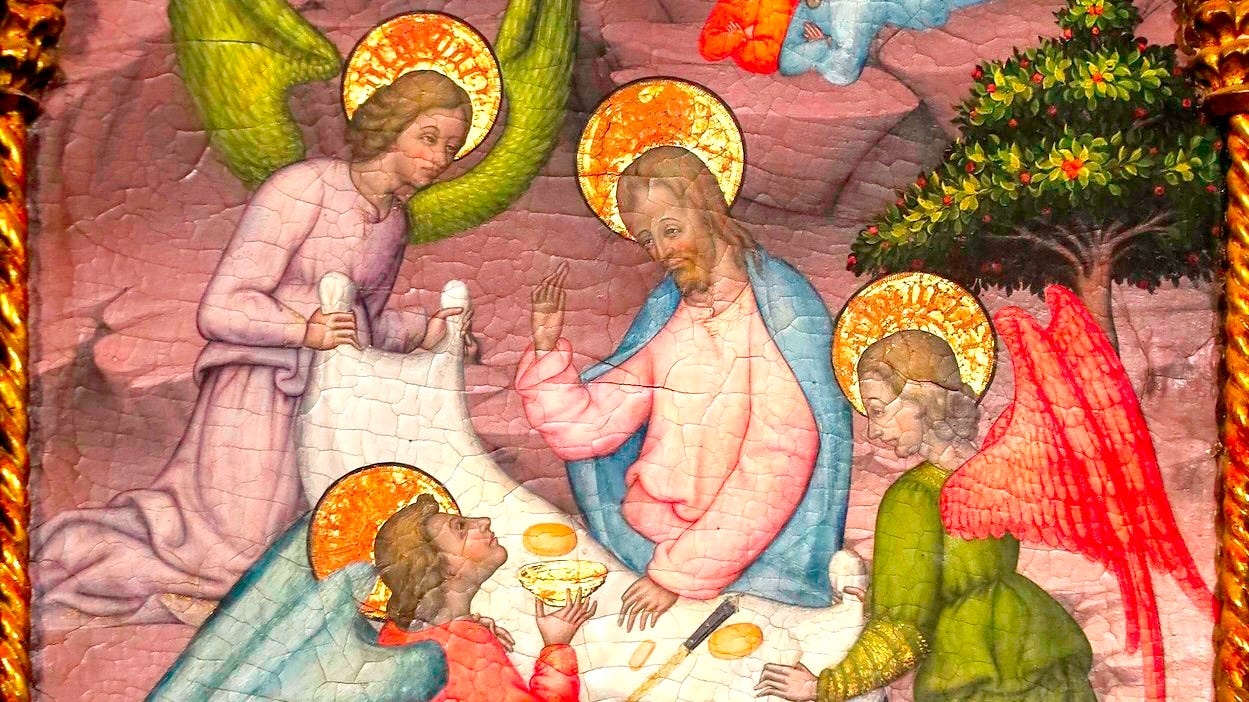The most overlooked part of Christ's forty days in the desert
More happened in the desert than just Christ's fasting and temptation.

More happened in the desert than just Christ's fasting and temptation.
Editor’s Notes
The Gospel of the First Sunday of Lent recounts Christ’s forty days in the wilderness, fasting and being tempted by the Devil. This takes place immediately after Christ’s baptism by St John the Baptist, and precedes the beginning of his public ministry.
However, popular adaptations of the Life of Christ tend to end their presentations of this event (if they include it) with the final temptation. In so doing, they neglect to consider…
The victory which Christ has achieved
A third, important aspect of this episode—that angels came to Christ and ministered to him.
In this piece, Fr. Coleridge tells us…
How Christ, in his humanity, condescends to receive the angels’ ministry
That divine consolation follows endurance in temptation
Why the presence of Angels and demons is significant in spiritual warfare.
He shows us that those who persevere in trial will know the joy of divine consolation, both in this life and in eternity.
In the course of this text, Coleridge refers to the classic work of Ludolph of Saxony, which helped to call St Ignatius of Loyola to his life of sanctity. Coleridge himself translated part of this enormous work, but it is now available in full.
The Ministering Angels
The Ministry of St. John the Baptist
Chapter VI
St. Matt. iv. 11; St. Mark i. 13; St. Luke iv. 13.
Story of the Gospels, § 18
Burns and Oates, London, 1888
Headings and some line breaks added.
Sung on First Sunday of Lent
Part I: What does Christ’s victory in the desert mean for us?
Part II: The most overlooked part of Christ's forty days in the desert
How the food was supplied—Ludolph of Saxony
It seems as if our Lord had now allowed the fatigue and strain and weakness which His long fast and severe temptations would naturally cause Him to have their full effect, and that He condescended, as afterwards in His Agony in the Garden, to receive support and refreshment from the angels. Holy contemplative souls have often dwelt on this scene, and imagined the manner in which His food and refreshment were borne to Him by the angels, and the solemn and calm rejoicings with which they would celebrate His victory.
As it is not foreign to the object of this work to assist that use of the Christian imagination, which, though it is not the substantial part of mental prayer, is yet highly valuable as one of its great helps, we may dwell for a moment upon one of the pictures of this mystery drawn by the servants of God. Ludolph, the Carthusian, begins by bidding us ‘attend diligently and gaze upon our Lord as He eats in solitude, the angels standing around Him, and consider all things well,’ he says, ‘for they are very beautiful and devout.’
‘And I ask myself, what was it that the angels brought to Him to eat after so long a fast? The Scripture does not tell us, and we may arrange that triumphant banquet as we like. And if we consider His power, He could create what things He chose, or, at His will, have taken any created things whatever.
‘But we do not find that He used this power of His for Himself or for His disciples. He used it for the crowds whom He twice fed in great numbers with a few loaves, but of His disciples we read that with Him present with them they plucked the ears of corn from hunger and ate them, and in like manner when, wearied by His journey, He sat by the well talking with the Samaritan woman, it is not said that He created food for Himself, but that He sent His disciples into the town to seek for it. Nor is it probable that He would provide for Himself by miracle, for He usually wrought His miracles for the edification of others and in the presence of many, whereas here none were present but the angels.’
And then he goes on to suppose that as there were no human habitations on the mountain of Quarantana, the angels must have brought our Lord food from a distance, as had been done to Daniel when he was in the den of lions,1 and so he imagines that our Lord allowed the angels to visit our Blessed Lady and ask her to send by them some food to her Son.
‘Look upon Him well,’ he continues, ‘in each thing that He does and in all that takes place.’
The rest of this article is for our monthly/annual supporters.
The Father Coleridge Reader is a labour of love.
But curating, cleaning up and publishing these texts takes a lot of time—and we like to give a little back to those who support the project with monthly/annual subscriptions.
Please consider joining to keep this project going!



